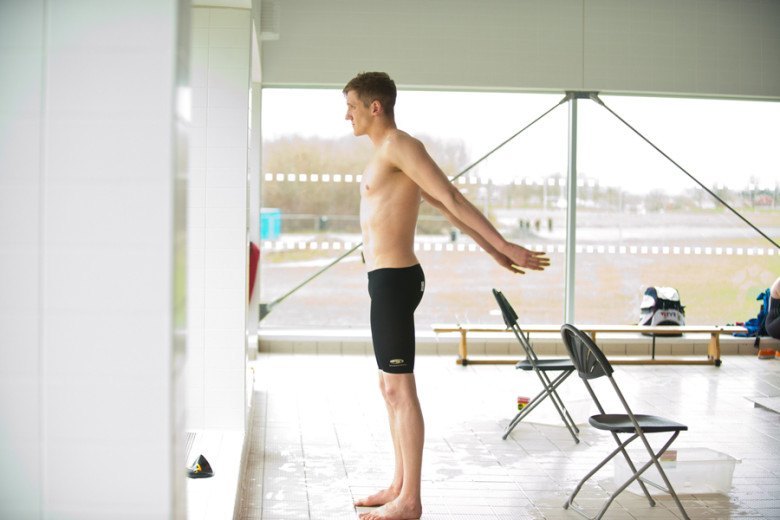The foam roller is now as common on pool desk as swimsuits and goggles. But do they provide significant benefits? And how should you use them correctly to benefit swimming?
Swimmers guide to foam rolling, images below:
- You can roll any muscle group in your body to help relieve knots or tension
- Focus on particular tight, painful spots by applying pressure there, or roll along a whole muscle
- Avoid joints and injured areas
- If you need to apply more pressure, reduce the number of points touching the floor and use your own body weight to push into the foam roller
British senior international freestyler and blueseventy athlete Alfie Howes explained: “Our physiotherapist described it to us that the roller is like a physio’s hand, so if you use it right it’s like a sports massage.”
Based at the University of Bath, Alfie trains alongside some of Britain’s top international competitors such as Michael Jamieson, Lizzie Simmonds and Joe Roebuck.
Alfie, a 200m-freestyler swimmer, is eying up a place on Team England for the Commonwealth Games in Glasgow this summer. With a training routine covering 60km in the pool each week and weights and extra gym sessions on top, he said regular foam rolling is now a big part of his routine:
“I have struggled in the past with shoulder injuries and tightness in my lower back because my hamstrings aren’t that flexible. I was encouraged by my physio to use a foam roller and it really helped.
“I get knots in my back and having something that helps me work these out on my own is ideal. I try to roll about three times a day. I take my roller to training sessions to use before and after, then when I get home in the evening I’ll usually roll out while I watch TV. Usually it takes me about 15 minutes to do a full body roll out.
“It’s down time like that when it’s great to utilise this kind of recovery. It’s something really simple to do, and you’ll feel the benefit in your next session compared to if you just sit on the couch. I find I just seize up and ache more if I do nothing.”
Foam rollers are not just a part of swimmers training routines, they’re also a important on race days. Alfie added that he wouldn’t go to a swim meet without it:
“No way would I leave it at home for competitions. It’s now as an important piece of my swim kit as my goggles and it’s become part of my race routine. You can use it to warm up your muscles as well as helping them to recover, so I use it before and after I race.”
“I’d definitely recommend using a foam roller, not just because it helps with warming up and recovery from hard training sessions, but because it’s the little things like that you do out of the water, that make the difference in the water.”
Good luck to Alfie at the British Gas Swimming Championships next month, where he hopes to earn his place on England’s Commonwealth Team.
The British Gas Swimming Championships take place in Glasgow, Scotland, 10-15 April.
For the latest news and blogs from blueseventy visit www.blueseventy.com. Instagram: @blue_seventy, Twitter: @blueseventy, Facebook: facebook.com/blueseventy.
Alfie recommends these key areas for swimmers – perform each roll for up to three minutes then rest and repeat:
1. Lower back and glutes
1 a. Add pressure to this stretch by lifting one leg off the floor
2. IT band and hips
3. Lats and shoulder – this is a key one for swimmers!
4. Triceps and shoulder
 For the latest news and blogs from blueseventy visit www.blueseventy.com.
For the latest news and blogs from blueseventy visit www.blueseventy.com.
Instagram: @blue_seventy
Facebook: facebook.com/blueseventy
Courtesy of blueseventy, a SwimSwam partner.






I use a foam roller during my pre-workout routine. I recommend it to all swimmers that sign up to our swim clinics. I’ve found that it really improves my mobility and warms up my muscles. Together with a mobility routine, you’ll have an arsenal to shield you from the risk of injury.
Foam rolling my lower back and hamstrings immediately after a workout really seems to cut down on soreness in my lower back the day after I do heavy squats and deadlifts.